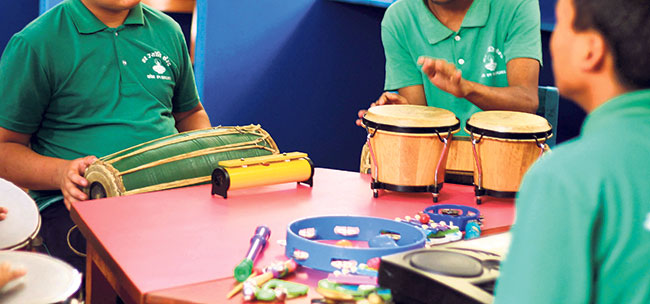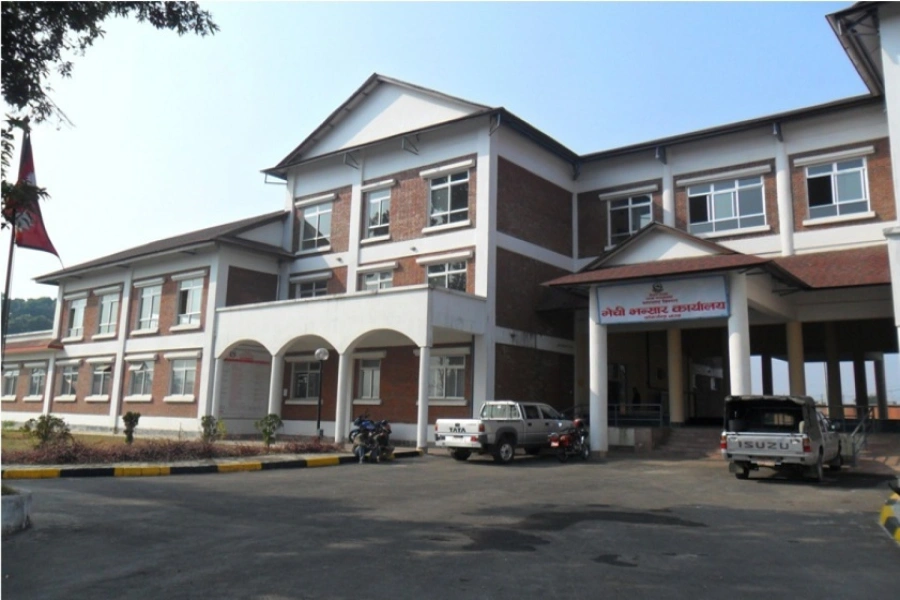Jolly, funky or loud, music has never ceased to amuse us. Regardless of the diverse origins and dissimilar categories we belong to, music has become a medium for building an emotional bond, helping ease communication.
Many studies and researches show that playing a musical instrument practically stimulates every area of the brain, especially the visual, auditory and motor cortices. The visible impacts can be observed in the spaces where music is a part of daily activity.
After being diagnosed with a learning disorder, 10-year-old Rajesh Sharma (name changed) was enrolled in Navjyoti Child Center in Baluwatar. Like many of his friends dealing with intellectual disabilities, he seemed to tune well with his therapist, Amrit Gandhari, during the hour-long session. “Pratik shows more signs of excitement in the therapy session than in the playground. His inclination toward music is high, which makes it convenient for him to learn and restore memory through music,” says Gandhari. “Music therapy is a client-based approach. During my sessions, I conduct certain methods of assessment to study child behavior. It helps me collect further insights into the child’s interests, which can later help evaluate the graph of a child’s behavioral and intellectual improvement.”
Alternative way of healing

The age-long tradition of listening and playing music is considered a subject of recreation and entertainment. However, music is mostly observed as a stimulant of sensory organs. In reality, science has proven music as a mode of fostering a person’s psychological well-being. “Through music therapy, children with intellectual disability including Autism, Down’s syndrome, Mental Retardation, Attention Deficit Hyperactivity Disorder (ADHD), Learning Disorder, etc. are able to increase the level of their concentration. They also discover their interest in music,” says Lisa, the head in-charge of Navjyoti Center. “The therapy is equally effective in mellowing down hyperactivity in children.”
“Whether they are living with neurodevelopment disabilities or possess a healthy state of mind, children have similar basic requirements. When we align our education system catering to the needs of children with neurodevelopment disabilities, all children can benefit,” says Prathama Raghavan, Mental health and Disability Professional and school counselor at the Ullens IB program.

“Music therapy, a way of self-expression, is like psychotherapy. It is an art therapy that enhances mental health and well-being and helps people transfer skills and insights. Music therapy-based interventions can help children with anxiety, stress and other difficulties to find ways to soothe and understand their bodies and minds better,” added Raghavan.
Being a new psycho-medical subject matter, only has a handful of private institutions, still seeking government affiliation, teaches the skills of music therapy. However, India has been the most convenient escape for scholars seeking a formal degree in music therapy. “There are only a handful of music therapists in Nepal who have completed their Post Graduate Diploma in Clinical Music Therapy from The Music Therapy Trust in Delhi,” informed Kedar Gandhari. He has been working as a clinical music therapist for the past 10 years. “The lack of government affiliation in the field raises questions concerning the sustainability of music therapy as a profession here. These uncertainties not only put our existence in dilemma but also deprives the society from benefitting from the therapeutic process of leading a sound life through music therapy” he added.
Talking about the level of awareness of music therapy, Shreeti Pradhan stated that the word therapy is associated only with people in need of emotional support. However, music therapy has a wide spectrum of possibilities of treating people with or without a formal diagnosis. It can be perceived simply as meditation or exercise. She further added, “Because it is about having a closer observation with the client’s psycho-social behavior, studying the right method and having assessment and evaluation is crucial. It is more than about being vocally versatile and learning to play several instruments”.
Nevertheless, the attitudinal and behavioral change in parents of children with intellectual disability is taking a positive shift. “Parents who were reluctant to discuss their children’s condition have started sharing instances that indicate their children’s progress. It has also become a way of letting people know about the indispensable role of healing through the uniquely designed medium of music,” added Lisa.
 ISTOCK
ISTOCK
With a limited human resource and an unregistered practice, a diverse group of people, especially children are likely to face the impact of the lack. The urge to address the emotional need of those groups in stress and trauma should be realized to ensure the full-fledged growth of every individual. Music therapy, an effective means of improving the psycho-social welfare, sees a dire need to promote its effectiveness.
“Mental health and wellbeing of our children need to become everybody’s responsibility - communities, schools, and families. We need to work toward creating trauma-sensitive spaces in schools where children of all kinds of abilities can study together sharing mutual respect for one another,” added Raghavan.








































